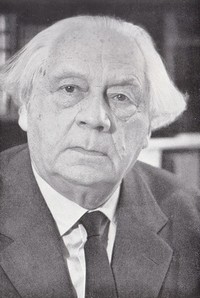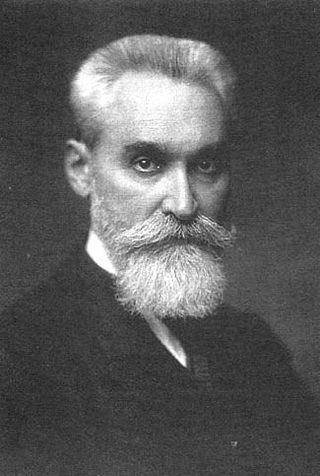Related Research Articles

Sir Paul Gavrilovitch Vinogradoff was a Russian and British historian and medievalist.

The Bauman Moscow State Technical University, BMSTU, sometimes colloquially referred as the Bauman School or Baumanka is a public technical university (Polytechnic) located in Moscow, Russia. Bauman University offers B.S., M.S & PhD degrees in various engineering fields and applied sciences.

Georgy Vasilyevich Chicherin was a Russian Marxist revolutionary and a Soviet politician who served as the first People's Commissar for Foreign Affairs in the Soviet government from March 1918 to July 1930.

Boris Nikolayevich Chicherin was a Russian jurist and political philosopher, who worked out a theory that Russia needed a strong, authoritative government to persevere with liberal reforms. By the time of the Russian Revolution, Chicherin was probably the most reputable legal philosopher and historian in Russia.

Ivan Alexandrovich Ilyin or Il'in was a Russian jurist, religious and political philosopher, publicist, orator, and conservative monarchist. He perceived the February Revolution as a "temporary disorder", and the October Revolution as a "national catastrophe", and actively joined the struggle against the Bolshevik regime. He became a white émigré journalist, a Slavophile and an ideologue of the Russian All-Military Union which believed that force was the only means by which the Soviet regime could be toppled.

Maksim Maksimovich Kovalevsky was a Russian jurist and the main authority on sociology in the Russian Empire. He was vice-president (1895) and president (1905) of the International Institute of Sociology. He also held a chair in sociology at the Psycho-Neurological Institute. Kovalevsky was elected into the Russian Academy of Sciences in 1914. The Russian Sociological Society adopted his name in 1916.

Alexander Moiseyevich Piatigorsky was a Soviet dissident, Russian philosopher, scholar of Indian philosophy and culture, historian, philologist, semiotician, writer. Well-versed in the study of language, he knew Sanskrit, Tamil, Pali, Tibetan, German, Russian, French, Italian and English. In an obituary appearing in the English-language newspaper The Guardian, he was cited as "a man who was widely considered to be one of the more significant thinkers of the age and Russia's greatest philosopher." On Russian television stations he was mourned as "the greatest Russian philosopher."

Vasily Alekseyevich Maklakov was a Russian student activist, a trial lawyer and liberal parliamentary deputy, an orator, and one of the leaders of the Constitutional Democratic Party, notable for his advocacy of a constitutional Russian state. He served as deputy in the (radical) Second, and conservative Third and Fourth State Duma. According to Stephen F. Williams Maklakov is "an inviting lens to which to view at the last years of Tsarism".

Russian philosophy is a collective name for the philosophical heritage of Russian thinkers.

Vladimir Emmanuilovich Grabar — was a Russian and Soviet jurist. The brother of painter Igor Grabar, and the husband of philologue and translator Maria Grabar-Passek. He is one of the leading specialists in international law of the pre-revolutionary and post-Revolutionary Soviet period. Grabar was held a number of leading posts during his impressive and broad career, including: professor of international law, academician, dean, legal advisor to the Imperial Russian government and the Soviet state, internationally recognized jurist and historian. His academic and professional career encompassed the last decades of the Russian empire and the first four decades of the Soviet period. His most notable work on the history of international law in Russia (1647-1917) guaranteed a visible place not only in the Russian legal academy but also abroad.
Fyodor Ivanovich Kozhevnikov was a Soviet jurist and legal expert.

Vladimir Ivanovich Guerrier was a Russian historian, professor of history at Moscow State University from 1868 to 1904. As the founder of the "Courses Guerrier", he was a leading instigator of higher education for women in Russia.

Vladimir Ivanovich Kovalevsky was a Russian statesman, scientist and entrepreneur. He was the author of numerous articles and works on agricultural themes. From 1892 to 1900, he was the director of the Commerce and Manufacturing Department of the Ministry of Finance of the Russian Empire, and one of the fathers of the concept of Russian protectionism. From 1900 to 1902, he was the Deputy Minister of Finance. From 1906 to 1916, he was the chairman of the Russian Technical Society. Kovalevsky was one of the creators of the Saint Petersburg State Polytechnical University and the Institute of Plant Industry in Leningrad.

Vechernyaya Moskva is a Russian local newspaper published in Moscow since 6 December 1923 daily. It was founded as an organ of the Mossovet, later as an organ of the city committee of the CPSU and the Mossovet. Since 1990 it is published by the joint-stock company Concern 'Vechernyaya Moskva'.

Fyodor Avgustovich Stepun was a Russian and German writer, philosopher, historian and sociologist.

Nikolay Alexeyevich Maklakov (N.S.) was a Chamberlain of the Imperial court, a Russian monarchist, and a prominent right-wing statesman. He was a governor in the Ukrain and state councillor who served as Russia's Interior Minister from 16 December 1912 – 5 June 1915. His older brother, Vasily Maklakov was a famous lawyer and liberal deputy in the State Duma ; his younger brother was an ophthalmologist.

Vladimir Georgiyevich Helfreich or Gelfreikh was a Soviet and Russian architect, teacher, professor.

Pavel Ivanovich Novgorodtsev was a Russian lawyer and philosopher.
References
- ↑ The Twilight of Imperial Russia. Oxford University Press US, 1974. ISBN 0-19-519787-9. p. 169.
Simmons, Ernest J. "Two Types of Russian Liberalism: Maklakov and Miliukov", in Continuity and Change in Russian and Soviet Thought. Harvard University Press, 1955, 129–43. - ↑ Wortman, Richard S. (1976). The Development of a Russian Legal Consciousness. University of Chicago Press. ISBN 0-226-90776-7 – via Internet Archive.
Уортман, Ричард С. (2004). Властители и судии: Развитие правового сознания в императорской России / Vlastiteli i sudii: Razvitie pravovogo soznaniia v imperatorskoi Rossii[Rulers and Judges: The Development of Legal Consciousness in Imperial Russia] (in Russian). Translated by М. Долбилов / M. Dolbilov; Федор Севастьянов / Fedor Sevastyanov. Москва [Moscow]: Новое литературное обозрение / Novoe literaturnoe obozrenie [New Literary Review]. ISBN 5-86793-273-7.
Wortman, Richard S. (Winter 2005). "Russian Monarchy and the Rule of Law: New Considerations of the Court Reform of 1864" (PDF). Kritika . 6 (1): 145–170. doi:10.1353/kri.2005.0016. S2CID 159553227. - ↑ Pomeranz, William E. (2018). Law and the Russian State: Russia's Legal Evolution from Peter the Great to Vladimir Putin. Bloomsbury Academic. ISBN 978-1-4742-2422-2.